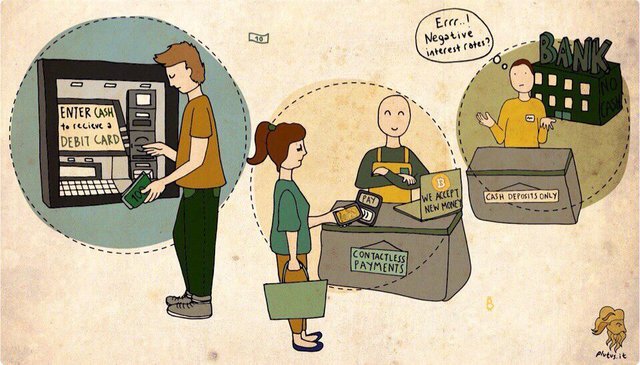BITCOIN AND CASHLESS SOCIETY

In 1250 BC, Florence began to walk the gold coin, the Florin, which maintained its stable value for over a hundred years. Florin was made everywhere in Europe and its sturdy stability stimulated the international trade throughout the continent. But since money has changed.
In 2016, with the proliferation of contactless payments we have seen the disappearance of paper money and closer to a cashless existence. Now send and receive money using only one phone that we almost always carry with them. Someone famous, describing the freedom that we give Bitcoin and smartphones, very aptly: "Now everyone in his pocket the Swiss Bank account".
There is already a lot of research, calling for a cashless society. Although most of them focus on different unexpected advantages of a cashless world (e.g., reduce the spread of germs) and forget about the possible drawbacks that may affect the society and people.
It is interesting that cashless economy will lead to a further flourishing online black market, which, as witnessed by recent research, contributes to a significant reduction in the level of violent crime and improve the quality of prohibited products. This effect can be explained by the lack of personal interaction between customer and seller, and therefore lack the potential for robbery or assault.
And if a cashless economy will affect the street entrepreneurs and intermediaries, organized crime and cartels, with strong ties with the traditional financial system did not suffer. Since banks are always readily engaged in the laundering of illicit proceeds, the cartels, having no connection with banks and financial institutions will be gradually driven out of the market.
The effects of the recession 2008
However, the strongest catalyst for the transition to a cashless economy could be the economic consequences of the last recession. And although the technology to move to a cashless society appeared during the implementation of the first electronic transfer in the 70-ies until today had neither the political will nor the necessary agreements to implement such significant changes.
Now during a recent meeting in Davos, the policy of many States did not keep its calls for the transition to a cashless society. And after the last recession, the Central banks have all the leverage for his immense impact on the economy. In an attempt to stimulate economic growth the government is constantly lowered interest rates.
Today, in all advanced economies, EEC, USA, Japan, UK, interest rates close to zero. However, in Europe and Japan, the recovery almost came to a standstill. Although us economic growth and higher than in other countries, it is still far from indicators of the previous periods.
Worst of all, now experiencing a slowdown of economic growth in developed countries and in the manufacturing sector is a recession, especially due to the fact that in attempts to stimulate its economy, China holds the yuan's devaluation. At the same time, the printing of new money in huge volumes seem to be not-so-rational decision. The so-called saturation of the economy the money supply leads to increase in public debt without any prospects of repayment. It seems that many politicians do not think about the consequences of bringing their country into a deeper economic abyss.
The promotion of economic growth
Now Central banks should think about the introduction of negative interest rates. Countries such as Denmark, Sweden and Switzerland, have introduced them a long time, and now they were joined by Japan. Although the rates did not fall below -1%.
Also, to make negative interest rates more effective, governments should move to a fully cashless economy. So if the interest rate is zero, there still remains a point of keeping money in the Bank. But if the rate falls to -3%, your savings will probably feel better in digital assets such as Bitcoin or Ethereum, not associated with traditional financial system.
In other words, assets such as gold, Bitcoin and even a dollar, have no income, because not designed for it. After all, real money lack of risks.
Official interest rates close to zero will still allow banks not to deduct amount from your account. But the situation will change dramatically once rates fall to -3%. In this case, the banks will have no choice but to charge you for the opportunity to keep money in the Bank. Although it can be regarded not so much as a fee for services, but as a form of financial pressure. Analysts said interest rates could fall significantly: to -4.5% in the Euro area, is 3.5% in Japan to 1.5% in the US.
Bitcoin becomes the new money
The transition to a cashless economy will increase the interest of the society to such money archetypes, like gold. But it can be argued that considerable attention will draw and digital money: Bitcoin, Ether and other types of decentralized currencies.
To maintain a growing ecosystem of digital currencies, the company Plutus has developed a mobile application whereby users can download and spend the digital money at any shop equipped with NFC technology.